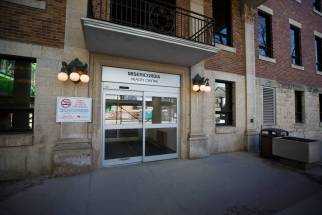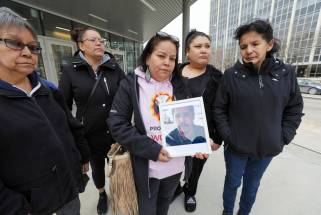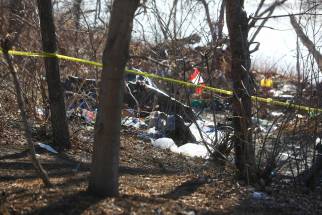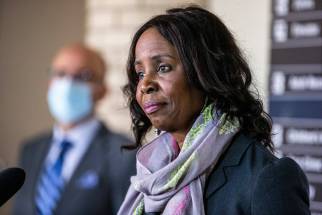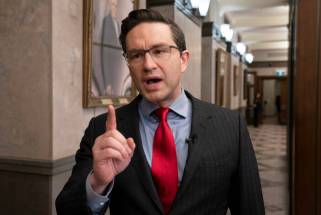Provincial task force cites ‘minimal private sector involvement’ in criticizing MDs’ proposal Frustrated sleep specialists’ resigned after plan to reduce Misericordia clinic’s backlog repeatedly returned noting ‘deficiencies’
Read this article for free:
or
Already have an account? Log in here »
To continue reading, please subscribe:
Monthly Digital Subscription
$0 for the first 4 weeks*
- Enjoy unlimited reading on winnipegfreepress.com
- Read the E-Edition, our digital replica newspaper
- Access News Break, our award-winning app
- Play interactive puzzles
*No charge for 4 weeks then price increases to the regular rate of $19.00 plus GST every four weeks. Offer available to new and qualified returning subscribers only. Cancel any time.
Monthly Digital Subscription
$4.75/week*
- Enjoy unlimited reading on winnipegfreepress.com
- Read the E-Edition, our digital replica newspaper
- Access News Break, our award-winning app
- Play interactive puzzles
*Billed as $19 plus GST every four weeks. Cancel any time.
To continue reading, please subscribe:
Add Free Press access to your Brandon Sun subscription for only an additional
$1 for the first 4 weeks*
*Your next subscription payment will increase by $1.00 and you will be charged $16.99 plus GST for four weeks. After four weeks, your payment will increase to $23.99 plus GST every four weeks.
Read unlimited articles for free today:
or
Already have an account? Log in here »
Hey there, time traveller!
This article was published 18/04/2023 (966 days ago), so information in it may no longer be current.
A provincial task force repeatedly turned thumbs-down on doctors’ proposed health system improvements, in part, because of “minimal private sector involvement,” a letter obtained by the Free Press reveals.
Two specialists at the Misericordia Health Centre’s Sleep Disorder Centre formally withdrew this month from the provincial surgery and diagnostic recovery task force, which accepted their resignations with a letter that attempted to provide a “complete understanding” of its interactions with the facility and its response to the lab’s backlog-reduction proposal.
The proposal, put forward by Sleep Disorder Centre leaders Dr. Eleni Giannouli and Dr. Nancy Porhownik, is still under review by the diagnostic and surgical recovery task force (referred to by the province as DSRTF). It set out a plan to eliminate sleep-disorder testing and treatment backlogs within three years with more funding, staffing and up-to-date equipment.
The proposal was repeatedly sent back to them for “deficiencies” over the course of almost a year. One of the deficiencies was that it didn’t focus enough on private contractors, according to a timeline of events sent in the April 14 letter from the task force to Giannouli and Porhownik, acknowledging their resignation from the task force.
“The proposal included only minimal private sector involvement, while a key interim initiative of the DSRTF is engaging partners to ensure patients get the care they need more quickly than current system capacity allows. As such, the DSRTF suggested some sleep study patient volume could be addressed through a vendor partnership with Cerebra,” states the letter signed by David Matear, executive director of the task force, and Dr. Peter MacDonald, head of its steering committee.
Cerebra is a Manitoba-based company that uses in-home technology to diagnose sleep problems.
The task force letter also states the panel is expected to function for only two to three years, so any longer-term proposals need not apply and must go through regular budget processes.
The provincial government and health minister’s office didn’t respond to requests for comment and did not grant an interview request Tuesday to speak with task force officials. They also did not answer questions about the role of private contracts in the task force’s mandate, or say when the task force will end its work.
Critics are interpreting the statement from the task force as an explicit admission that its mandate prioritized private contracts over long-term plans to increase staff and improve the health system by using a procurement process that created obstacles for internal proposals that tried to tackle backlogs.
JESSICA LEE / FREE PRESS FILES The letter was co-signed by David Matear, executive director of the task force.
In question period at the legislature Tuesday, NDP Leader Wab Kinew used the letter to criticize the government’s focus on privatization.
“It’s clear that the premier and her cabinet always put ideology ahead of getting things done here in Manitoba,” Kinew said, tabling a copy of the document the NDP separately obtained.
Premier Heather Stefanson pushed back, arguing the task force was set up to get patients the procedures they need, when they need them. She said her government has already increased the health budget and thanked the task force for putting patients first.
“They are contracting out some of those services. That gets patients the health care that they need sooner. It is not taking an ideological approach, like the NDP, which is the wrong way,” she told the house.
The NDP provided another letter, dated November 2022, with redacted signatures from all of Grace Hospital’s orthopedic surgeons. The letter pleaded with the government to address the lack of capacity for hip- and knee-replacement surgeries. The doctors stated they’d tried to work with the task force, but had “yet to receive a meaningful reply.”
“It’s clear that the premier and her cabinet always put ideology ahead of getting things done here in Manitoba.”–Wab Kinew
In a statement to the Free Press Monday, a government spokesman denied that the two sleep specialists were official members of the task force and said their resignations were due to being “no longer available” to be clinical planning advisers for the task force.
The statement also disputed that patients who completed a sleep study through the province’s contract with Cerebra would end up being sent back to the Sleep Disorder Centre for treatment. That statement contradicts what the two doctors and Cerebra have said, and also contradicts task force documentation obtained by the Free Press.
The government did not respond to a request for additional explanation. Instead, a spokesman from the province sent a statement late Tuesday afternoon.
”The (task force) was initially created to address the backlog of procedures created by the world-wide pandemic. We look forward to providing an update of the work and outlook for the DSRTF in the coming days,” the statement said.
“Our government and the… DSRTF is concurrently investing in increasing procedures within the public health system, building long-term procedure capacity within the public health system, and procuring procedures both in and out of province to produce the best results and enable Manitobans to receive the care they need faster.”
Giannouli said she doesn’t know what the government meant by its statement Monday. She said her lab has been requesting updated equipment and more resources via the provincial budgeting process since 2018.
She said she raised concerns for months on the lab’s behalf asking for more information on the task force’s plans for patient followup care and never got an answer.
Giannouli described the proposal process as bureaucratic, and said the task force discussions were focused “almost exclusively on privatizing sleep studies.”
“It is difficult to imagine that the (task force) members were incapable of understanding our concerns and we can only conclude that improving flow was not the issue that they wanted to address. Unilaterally inserting Cerebra in the discussions made the government’s primary motivation quite apparent to us,” she wrote in a statement Tuesday.
“It is difficult to imagine that the (task force) members were incapable of understanding our concerns and we can only conclude that improving flow was not the issue that they wanted to address. Unilaterally inserting Cerebra in the discussions made the government’s primary motivation quite apparent to us.”–Dr. Eleni Giannouli.
She said she was concerned about the lab’s duty to patients and didn’t want to share patient names with Cerebra without more information about the government’s agreement with the private company.
But the task force stated, according to the documentation, it wasn’t the lab’s authority to protect patient names and they needed to be released for Cerebra to do its work.
The company was contracted to provide 1,000 at-home sleep tests, but it received the names of only 237 patients, who the company then had to contact. Just 158 studies were completed.
katie.may@winnipegfreepress.com

Katie May is a multimedia producer for the Free Press.
Our newsroom depends on a growing audience of readers to power our journalism. If you are not a paid reader, please consider becoming a subscriber.
Our newsroom depends on its audience of readers to power our journalism. Thank you for your support.










